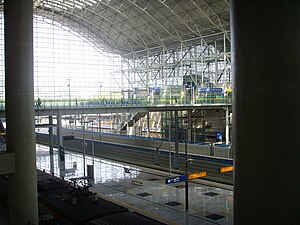Gwangmyeong Station
Gwangmyeong Station | |
|---|---|
 | |
| General information | |
| Location | 267-8 Iljik-dong, 21 Gwangmyeongyeongno, Gwangmyeong-si, Gyeonggi-do |
| Coordinates | 37°24′59″N 126°53′6″E / 37.41639°N 126.88500°E |
| Operated by | Korail |
| Line(s) | Lua error: expandTemplate: template "SMS color" does not exist. |
| Platforms | 4 |
| Tracks | 6 |
| Construction | |
| Structure type | Aboveground |
| Key dates | |
| April 1, 2004 | Lua error: expandTemplate: template "SMS color" does not exist. opened |
| Passengers | |
| (Daily) Based on Jan–Dec 2012. KTX: 18,602[1] Line 1: 2,888[2] | |
Gwangmyeong Station (Korean: 광명역) is a train station in Gwangmyeong, South Korea. The station was newly built as a stop of national railway operator Korail's KTX high-speed service, 22.0 km (13.7 mi)* south of Seoul Station.[3]
The area surrounding the station is home to the world's largest IKEA store at 59,000 square meters (640,000 square feet),[4][5] along with a large Costco store and a Lotte Premium Outlet.
Similarly named stations
"Gwangmyeong Station" is the former name of Gwangmyeongsageori Station on Line 7 of the Seoul Subway and is also the name of a station on Line 2 of the Pyongyang Metro.
Station layout
| L3 Overpass connection |
| L2 Platforms |
||
| Southbound | → Line 1 Alighting passengers only → | |
| Platform 4 | → Line 1 Alighting passengers only → | |
| Platform 2 | → Line 1 Alighting passengers only → KTX Gyeongbu Line toward Busan (Cheonan-Asan) → | |
| Through tracks | → KTX Gyeongbu Line does not stop here → | |
| Through tracks | ← KTX Gyeongbu Line does not stop here | |
| Platform 1 | ← Line 1 toward Yeongdeungpo (Geumcheon-gu Office) ← KTX Gyeongbu Line toward Seoul or Haengsin (Seoul) | |
| Platform 3 | ← Line 1 toward Yeongdeungpo (Geumcheon-gu Office) | |
| Northbound | ← Line 1 toward Yeongdeungpo (Geumcheon-gu Office) | |
| L1 Concourse |
Lobby | Customer Service, Shops, Vending machines, ATMs |
| G | Street level | Exit |
History
Construction
The location of Gwangmyeong Station was finalised on October 14, 1994, though construction did not begin until December 1999. The planned name of "Namseoul Station" (literally meaning South Seoul Station) was changed to "Gwangmyeong Station" on August 28, 2000, and the station building was completed on March 27, 2004.
Construction cost was 406.8 billion won.[6]
Operation
The station opened with the start of KTX service on April 1, 2004.[7]
After opening in April 2004, Gwangmyeong Station was used by only an average 4,521 passengers a day.[6] However, ridership growth was one of the fastest among KTX stations, and the daily number of KTX passengers arriving or departing at the station reached 14,608 in 2008, surpassing Yongsan Station, the Seoul terminus of Honam KTX services.[6] In the first five years of service, until the end of February 2009, Gwangmyeong Station saw a total of 22,173,792 passenger boardings, again surpassing Yongsan Station.[8]
In passenger surveys conducted in the first months after the launch of KTX service, the problem mentioned most often was the lack of adequate local access for intermediate stations, especially the lack of a subway connection to the two new stations Gwangmyeong and Cheonan-Asan.[9] Gwangmyeong Station was linked to Seoul Subway Line 1 by a shuttle service from Yongsan on December 15, 2006.[10] However, the shuttle uses the same tracks as the KTX trains, resulting in a schedule with long waiting times between the arrival of KTX and subway trains, thus the service had little impact.[10] A 2008 survey of KTX passengers arriving or departing at Gwangmyeong Station found that 57% used private cars, 11% took a taxi, 28% took a bus, and only 4% took the subway train.[6]
When an additional KTX stop was proposed in 2004 at nearby Yeongdeungpo Station, some locals living around Gwangmyeong Station feared that Korail would kill Gwangmyeong Station by migrating all services to the new station, and formed an action group against the plan.[11] The action group gathered 880,000 signatures, forcing the government to drop the plans in late 2005.[11] When Yeongdeungpo Station was made a KTX stop for new services via Suwon starting with November 1, 2010, protests resumed.[11]

Building
Gwangmyeong Station is a glass structure surrounded by large car parking spaces. Outside of Exit 1 is a large Costco. Standing on a plot of land measuring 264,131 square metres (2,843,080 sq ft), the interior of the 48,184 square metres (518,650 sq ft) building is open, with the tracks, which approach the station from both directions through cuttings, sunken below the main concourse, yet visible to passengers waiting at ground level. There are two stories above ground level and two below. The building measures 297 by 148 metres (974 ft × 486 ft) in terms of internal available space. Originally meant to be the terminus for KTX lines,[citation needed] the size of the station was constructed accordingly. As the terminus changed to Seoul and Yongsan, the large difference between capacity and actual use the station and most prominently due to the size of the station, it has earned the nickname Gwangmyeong Airport by rail enthusiasts.
Services
Gwangmyeong Station is served by KTX trains on both the Gyeongbu and Honam KTX services.[12] Shuttle trains run every 40 min-1 hour to Yeongdeungpo, joining the Gyeongbu Line section of Line 1 at Siheung Station in Seoul. Gwangmyeong Station is not connected directly to other subway stations in the city of Gwangmyeong, namely Cheolsan and Gwangmyeongsageori, so it is necessary to change trains at Gasan Digital Complex Station in Seoul to travel there, or just take one of the many buses traveling to the station.
See also
References
- ^ Monthly Number of Passengers between General Railroad Stations. Korea Transportation Database, 2013. Retrieved 2013-10-15.
- ^ Monthly Number of Passengers between Subway Stations. Korea Transportation Database, 2013. Retrieved 2013-10-15.
- ^ "KTX 이용고객 2천만명 돌파" (PDF). The Chosun Ilbo. 2005-01-02. Retrieved 2010-10-31.
- ^ http://www.ikea.com/kr/ko/about_ikea/newsitem/2014-12-18
- ^ http://blogs.wsj.com/korearealtime/2014/11/18/poang-ikea-hits-headwinds-in-korea-as-it-preps-largest-store-ever/
- ^ a b c d "KTX, 영등포역 등 정차… "정부에 속았다" 광명시 부글부글" (in Korean). Gyeonggi Ilbo. 2010-10-27. Retrieved 2010-11-13.
- ^ "Introduction of KTX". Korail. Retrieved 2010-11-01.
- ^ "KTX 개통 5주년 보도자료" (in Korean). Rail Safety Information System. 2009-04-01. Archived from the original on 2010-11-11. Retrieved 2010-11-13.
- ^ D. Suh, Sunduck; Yang, Keun-Yul; Lee, Jae-Hoon; Ahn, Byung-Min; Kim, Jeong Hyun (2005). "EFFECTS OF THE KOREAN TRAIN EXPRESS (KTX) OPERATION ON THE NATIONAL TRANSPORT SYSTEM" (PDF). Proceedings of the Eastern Asia Society for Transportation Studies. 5: 175–189. Retrieved 2010-08-27.
- ^ a b "한 칸 승객 2명 … 공기만 싣고 달린다". JoongAng Ilbo. 2008-07-07. Retrieved 2010-10-29.
- ^ a b c 광명역은 이렇게 죽으라고? (in Korean). Pride of Gwang Myeong. 2010-10-08. Retrieved 2010-11-13.
- ^ "KTX Time Table 2010.11.01" (in Korean). Korail. Retrieved 2010-10-31.

